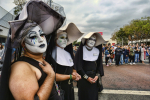'Perpetual Indulgence' Versus Religious Conviction
Since 1979, a group of men has dressed as grotesque parodies of nuns and publicly performed sexualized acts, calling itself the “Sisters of Perpetual Indulgence.” The organization exists to mock Christians in general, and Catholics in particular, for affirming certain truths about life, marriage, and human sexuality. The group has no limits to profaning that which Christians hold sacred. It even organizes outdoor burlesque reenactments of the Crucifixion of Christ.
The Los Angeles Dodgers invited the “Sisters” to participate in its Annual Pride Night and to receive its Community Hero Award. The Dodgers then disinvited them in the wake of an outcry from Catholics and other Christians. When the “Sisters” and others complained, the Dodgers decided to re-invite them and proceed with honoring them with the award.
Washington Nationals pitcher Trevor Williams recently released a statement rebuking the Dodgers for celebrating the “Sisters.” Williams is a friend and fellow Catholic. His statement is a public exercise of his Catholic faith, and he has incurred fierce criticism as a result.
Seeing photos, videos, and stories of the “Sisters” provokes in me a deep sense of sympathy for them. Everyone is made to selflessly love and be loved. Anyone who sexualizes themselves and others as intensely as this group reveals, at least in part, an unmet longing for that kind of love.
Perhaps this is why the group so ferociously fixates on nuns. Two of my dearest friends are religious sisters. They love God by serving people who are poor and sick: changing soiled garments, cleaning sores, and comforting the dying in the middle of the night. Poverty, chastity, obedience, prayer, self-sacrifice and self-denial, and modest dress exemplify their lives. They are joyful and free. All of this confounds the promoters of “perpetual indulgence.”
The group also reflects aspects of “sexual orientation and gender identity” (SOGI) ideology. SOGI proponents have been shaping segments of society for decades. At the heart of SOGI is a view of the human person and human fulfillment that is incompatible with the convictions of Catholics and many other religious people. The differences go beyond moral disagreement. They extend to questions of how to understand the place of desires, including sexual desire, identity in our lives and in reality itself, and whether the search for truth points us to look within ourselves or to a transcendent source. Such deep divides cannot be overcome easily.
Complicating matters in our time, culture-forming organizations, including professional sports teams like the Dodgers, affirm and celebrate SOGI ideology while religious people who dissent from it are increasingly subjected to lawsuits, public smears, government actions, and harmful legislation. These punitive acts have become so prevalent that my organization, the Religious Freedom Institute (RFI), launched a Crisis Toolkit to help religious organizations navigate this growing cultural hostility.
While today’s proponents of SOGI ideology have mostly targeted Catholics and other Christians, Jews and Muslims who share similar views on sexuality are also under intense pressure to change. Yeshiva University, America’s oldest Jewish university, is defending itself against litigation from the Yeshiva University Pride Alliance. The Alliance is seeking to force the university to officially recognize it as a university club. Recognition would compel the University to affirm and thereby participate in the Alliance’s SOGI claims.
Muslim parents just filed a lawsuit against a Maryland county board of education for forcing children – starting under the age of five – to read highly sexualized books that encourage “gender transitioning” and focus on romantic infatuation between members of the same sex – with no parental notification or opportunity to opt-out. They are part of a national movement of Muslim fathers and mothers who are challenging public schools that sexualize their children and corrode their innocence.
Religion involves belief in a transcendent source of ultimate meaning and living in accord with it as part of a religious community of shared belief and practice. In a world where each person is encouraged to look within to find “your truth,” the commitments of Christians like Trevor Williams can be baffling. Williams’ Catholic convictions and view of reality are no less mysterious to an organization like the Dodgers. It is even more incomprehensible to the group of “Sisters” that the Dodgers are honoring.
Deeply religious people seek their creator and see life as filled with profound purpose. Trevor Williams once told me during an interview at a Catholic retreat, “My faith is the most important thing in my life. Once you make that decision where you can say, ‘Yes, Lord, I love you, and you are the most important thing in my life,’ everything kind of falls to the wayside.”
America needs religious people to exercise their religious freedom “with malice toward none; with charity for all; with firmness in the right, as God gives us to see the right,” as Abraham Lincoln put it in his second inaugural address. Some witnesses will be more public, like Trevor Williams, Yeshiva University, and the Muslim parents in Maryland. Others will be quieter, more hidden, like the faithful religious sisters whom I am blessed to call friends. All of them must be free to make their distinct contribution to the common good of our society, including those who bear witness to the way the Church’s teachings on marriage and sexuality benefit all of society. Even if one rejects that claim, we should all be able to agree that mocking Catholic nuns who espouse those teachings is harmful to our common life. While allowable in our law, the “Sisters of Perpetual Indulgence” should not be given a place of honor by any culture-shaping organization in America.









